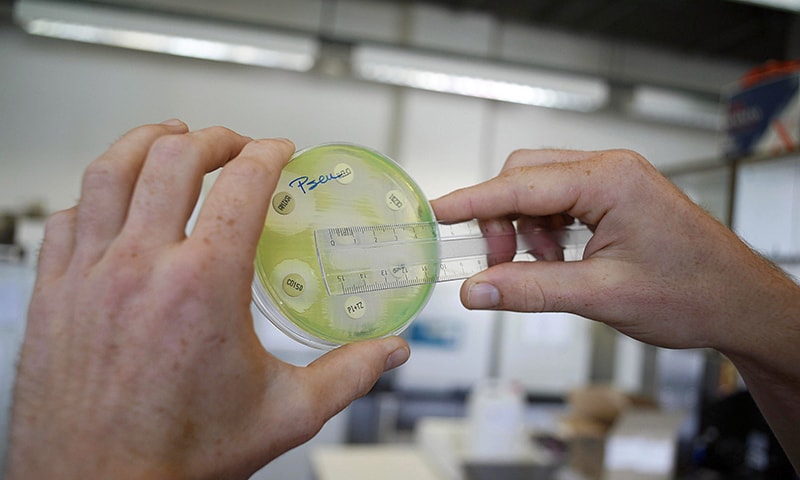WASHINGTON: There has been an outbreak of an extensively drug-resistant Salmonella Typhi in Pakistan where 5,372 cases of this typhoid fever were reported between 2016 and 2018, says an official US report.
Most of the cases were reported from Karachi and Hyderabad, warned the US Centre for Disease Control and Prevention (CDC) in its “Morbidity and Mortality” report.
The CDC researchers warn that the outbreak in Pakistan involves a Salmonella enterica serotype Typhi strain that is resistant to most antibiotics commonly used to treat the illness.
The report notes that 29 patients were diagnosed in the US with typhoid fever and all of them had travelled to or from Pakistan from 2016 to 2018.
The patients include five children with extensively drug-resistant infections. At least one travel-associated case was reported from the United Kingdom.
Comparing this to the 2006-15 period, the report points out that 79 per cent of US travellers to Pakistan who returned with typhoid fever during that period responded to therapeutic antibiotics.
The report — “Emergence of Extensively Drug-Resistant Salmonella Typhi Infections Among Travellers to or from Pakistan” — that between November 2016 and September 2017, 339 cases of this extensively drug-resistant Typhi strain were reported in Pakistan, mostly in Karachi and Hyderabad. But the number of cases rapidly increased to 5,372 by the end of 2018.
The disease is resistant to most therapeutic antibiotics, such as chloramphenicol, ampicillin, trimethoprim-sulfamethoxazole, fluoroquinolones, and third-generation cephalosporins.
But it can be cured with azithromycin and carbapenems. Carbapenems are a class of highly effective antibiotic agents commonly used for the treatment of severe or high-risk bacterial infections.
Researchers say that vaccination can help prevent typhoid fever but warn that common therapeutic antibiotics, such as fluoroquinolones, should not be used for empiric treatment of typhoid fever patients.
Instead, Azithromycin should be used to treat patients with suspected uncomplicated typhoid fever and carbapenems for patients with suspected severe or complicated typhoid fever.
The signs of complications include encephalopathy, which impacts the functioning of the brain, intestinal perforation, peritonitis, intestinal hemorrhage, or bacteremia with sepsis or shock.
The report also warns against the spread of the drug-resistant Typhi strain to neighbouring countries such as India. It notes that returning travellers from India typically account for 57 per cent to 69 per cent of typhoid fever cases reported to CDC.
Since a large number of people travel between the United States and South Asia, the US Department of Health regularly monitors outbreaks of various diseases in the region. Air travel monitors reported an estimated 2.4 million trips from the United States to India and 250,000 trips to Pakistan in 2017.
Published in Dawn, January 12th, 2019













































